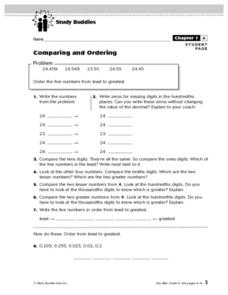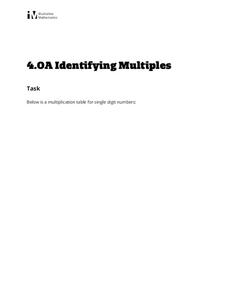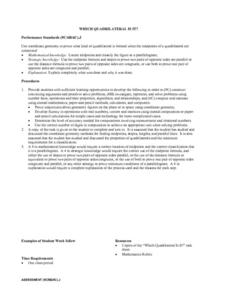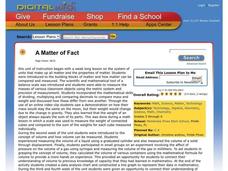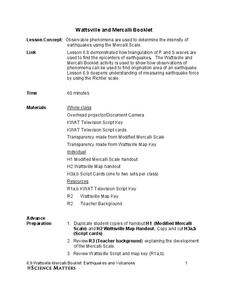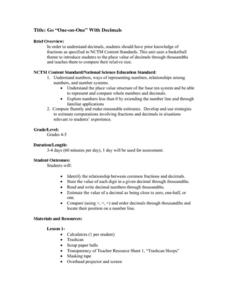Curated OER
Addition: Number Bonds to Fifty
In this identifying numbers that total fifty worksheet, students use an addend and the sum fifty to write the missing number. Students solve 41 problems.
Curated OER
Comparing and Ordering (Decimal Numbers)
In this math worksheet, young scholars learn to compare and order five numbers in a set. Numbers are decimals to the thousandths place. Students answer 8 questions. There are also activities which can be done with a partner.
Curated OER
Deci-order
Fourth graders play a game to practice their decimal number ordering skills. They use their knowledge of the number system to create the biggest decimal number. Students are dealt 3 cards each with the reminaing cards placed face down...
Curated OER
Greater Than or Less Than
In this comparing numbers worksheet, students compare 20 pairs of 1, 2 and 3-digit numbers. Students identify each pair as greater than or less than.
Curated OER
Detective Digis and the Computer Caper
Mathematicians participate in an hands-on activity to investigate the binary number system and write messages in binary code and have classmates decipher the messages. A said video on the topic does not seem to be available, but the...
Curated OER
Directed Numbers
In this math worksheet, students examine the values in order to find the sums of the positive and negative numbers with one digit.
Curated OER
Number Sequencing
In this number sequencing worksheet, 6th graders solve 5 different sets of numbers that include various types of sequences. They write the missing numbers in each set on the baseballs shown. Students add or subtract numbers when...
Illustrative Mathematics
Identifying Multiples
Administer an activity that fosters a child's understanding of multiples. Young mathematicians are guided to complete three tasks on a multiplication chart. Once they color the boxes with multiples of two, three, and four, learners...
Curated OER
Place Value Review: Tens and Ones Place
Young learners determine the place value of a digit in a given number. They review 10s and 1s place value by participating in activities using unit blocks. Some excellent independent practice is built in to this plan. A written...
Curated OER
Cross Out
In this number grid learning exercise, 3rd graders look over a number grid, cross out the numbers in 5 directives, fill in the blank to one question and then double check their answers. Students make their own original cross out grid.
Curated OER
Which Quadrilateral Is It?
Students prove conjectures about geometric figures on the plane or in space using coordinate geometry. They develop fluency in operations with real numbers, vectors and matrices using mental computation or paper-and-pencil calculations...
Curated OER
A Matter of Fact
Students design their own Science experiment. For this science experiment lesson students create a hypothesis related to matter and test it. They displayed their data in a graph.
Science Matters
Wattsville and Mercalli Booklet
There has been an earthquake! Can you listen to the description of damage given by callers in order to determine the epicenter? The 11th of 20 lessons has pupils read a script of one emergency caller. The class records the information on...
Balanced Assessment
Number Trick
Show your classes the magic of numbers. Using a number trick, learners practice writing algebraic expressions. They then use their expression to perform the trick. Their exploration should help them understand the magic behind the trick.
National Security Agency
Go One-on-One with Decimals
Shoot and score with three basketball-themed lessons about decimals. Young mathematicians compare game statistics, make trash can hoops, and play a data spinner game to practice identifying digits and values within decimal numbers.
Houghton Mifflin Harcourt
Unit 4 Math Vocabulary Cards (Grade 3)
Bring a set of 19 math vocabulary cards to your third grade math class. Each sheet contains two cards. The top half has the vocabulary word printed in bold text, while the bottom half has the definition of the word. Card topics...
Curated OER
Candy Land Math
Students order numbers and sets of objects from 0 through 10 and organize and interpret information collected from the immediate environment. They read and interpret graphs usin real objects and the computer. Finally, students sort a...
Curated OER
Hundreds, Tens, Ones
In this place values worksheet, learners solve the six word problems using place value numbers in the ones, tens, and hundreds. Students use base ten blocks and square unit blocks to help them solve the problems.
Curated OER
Less is More: Subtraction in Action
Students participate in group games to help review the concept of subtraction. During the games, they practice subtracting two-digit numbers and the concept of borrowing. They review their answers with the class and move on to...
Curated OER
Subtracting with Regrouping
Second graders explore math functions by completing a worksheet in class. In this subtraction lesson, 2nd graders identify the techniques used to assist in subtracting multi-digit numbers. Students complete a subtraction worksheet and...
Curated OER
Let's Learn Those Facts
Students practice adding one digit numbers. In this practicing adding one digit numbers instructional activity, students roll dice to determine which one-digit numbers they will add together. Students practice adding one...
Curated OER
Dividing a Candy Bar
Fourth graders explore number values by utilizing a candy bar in class. In this fraction lesson, 4th graders divide pizza and candy amongst each other in order to identify parts of a whole and fractions. Students answer several fraction...
Curated OER
How Many Pieces of Mail?
Fourth graders explore their multiplication skills. In this number sense lesson, students use their problem solving skills to solve a word problem that requires them to multiply 2 or 3-digit numbers by 1 or 2-digit numbers....
Curated OER
Too Many Tens
Pupils practice grouping in different ways by putting numbers up to 1,000 in the correct place value. In this place value lesson plan, students estimate items in a jar and then count them out by grouping them by 10s.

